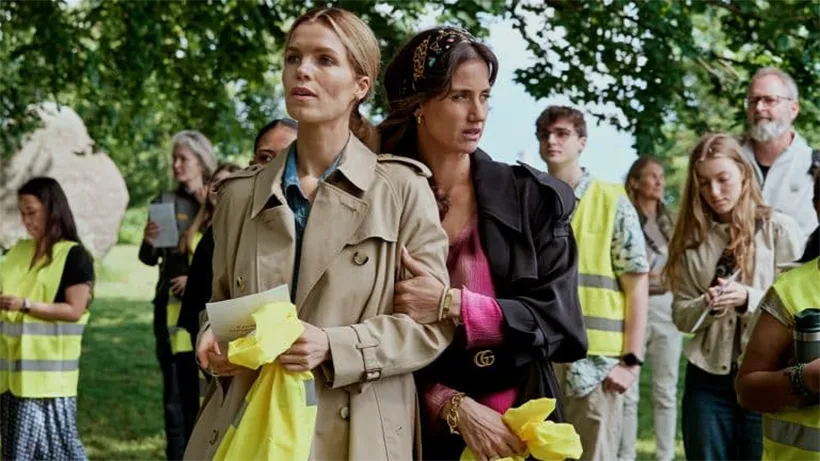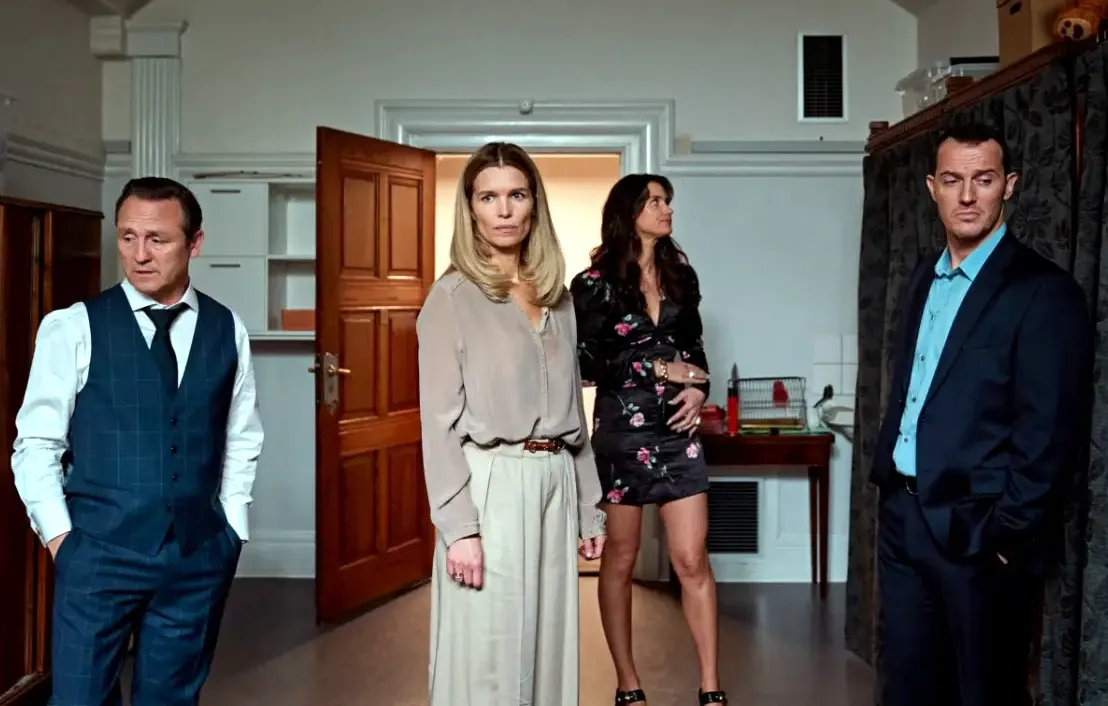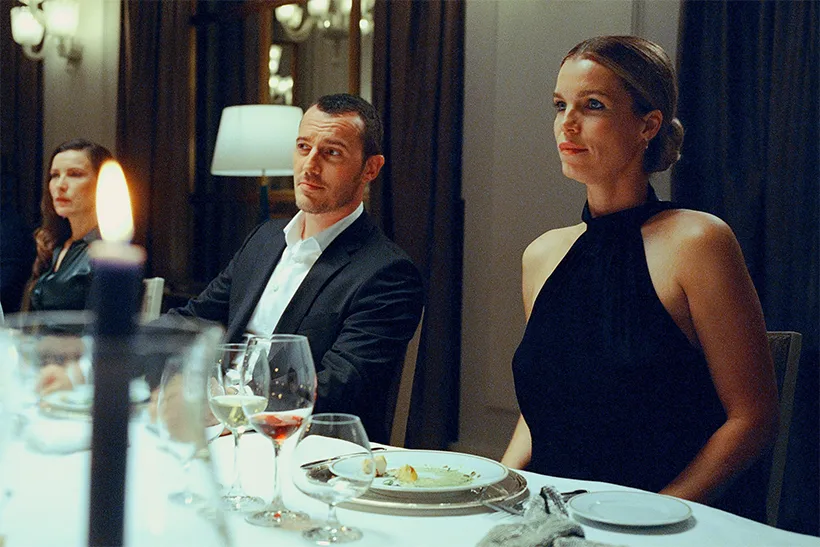Type and hit Enter to search
Experts in aesthetic surgery, dermatology, and beauty bring you the latest trends, research, and advice to help you make informed decisions about your appearance and health.
A web platform dedicated to aesthetic surgery, dermatology, and beauty, where expertise meets innovation, and your desires and needs become our mission. In a world where appearance and health go hand in hand, our platform leads the revolution, delivering the latest trends, research, and expert advice directly to you.
Our team consists of highly skilled professionals in the fields of aesthetic surgery and dermatology, committed to providing reliable information and guidance that will help you make informed choices about your appearance and well-being. We understand that every individual has unique needs and desires, which is why we approach each person with the utmost care and professionalism.
Powered by Aestetica Web Design © 2024
I watched Secrets We Keep – Now I side-eye every rich couple with a nanny (Review)
I didn’t expect Secrets We Keep to follow me into my kitchen, but here I am, side-eyeing my espresso machine and wondering who built my comfort. This review isn’t about jump scares—it’s about the quiet horror of affluence, power, and a missing woman no one really wants to find. In this Netflix series, Denmark’s elite sip wine while burying truths under designer rugs. I watched Secrets We Keep—and what unraveled wasn’t just a mystery, it was me.
I Got More Than Nordic Noir: Secrets We Keep Delivered a Social Autopsy—Review
Gilded cages and skeleton closets: Denmark’s prettiest prison
The North Zealand enclave where Secrets We Keep (Reservatet) unfolds is not just another postcard-perfect setting—it’s a sociological Rorschach test. Every pristine garden, every minimalist wine rack, becomes a quiet co-conspirator in a narrative about class disparity so normalized, it goes undetected by the very people perpetuating it. This isn’t just a look at Danish privilege; it’s an autopsy. The series uses affluent neighborhoods as its crime scene—places where the only thing more manicured than the hedges is the social blindness of the residents.
The architecture of denial: How design disguises decay
The brilliance of the show lies in how it weaponizes aesthetics. Wide glass doors and open-plan kitchens promise transparency and connection, yet they mask layers of detachment. Within these spaces, domestic tension simmers unnoticed because nothing looks out of place—until it does. The supposed “secrets behind Denmark’s affluent neighborhoods” are not really secrets at all; they’re simply the truths people are too polite—or too privileged—to see.

Nannies, lies, and quiet explosions in the living room
When childcare becomes collateral damage
Forget the Hallmark image of Scandinavian domestic life. Secrets We Keep skewers the fantasy by revealing what happens when emotional labor is offloaded like laundry. The show unpacks au pair exploitation with surgical precision—highlighting how domestic roles are framed as benevolent exchanges while systematically stripping workers of agency. Behind the smiles and “thank yous” is a hierarchy dressed in liberal values but built on outsourced care and convenient silence.
How the modern family runs on invisible power
The family at the heart of the series doesn’t implode with melodrama—it unravels with every small compromise. A wife too preoccupied to intervene, a husband too entitled to question his proximity to harm, and a disappearing au pair who disrupts the choreography. The show articulates the impact of outsourcing intimacy in affluent homes with a terrifying calm. You’re not watching a murder mystery—you’re watching what happens when ethical erosion becomes a lifestyle.
Smiling and silenced: The help that keeps the house running
Meet Angel and Ruby: Not victims, but censored voices
What sets Secrets We Keep apart is its refusal to paint migrant labor with pity. The Filipino au pairs are not just background noise—they’re the moral center. Ruby’s vanishing is not a plot twist; it’s a structural indictment. Angel, who begins investigating her friend’s disappearance, becomes the only character asking the right questions—because she’s the only one who doesn’t benefit from the current setup. The conditions of Filipino au pairs in Denmark aren’t accidental—they’re designed by comfort and enforced by indifference.
The paradox of proximity: Living in the house, yet outside the story
Despite physically sharing space with their employers, domestic workers remain socially and legally peripheral. The show captures this claustrophobic duality: they are always present, rarely seen, and never fully heard. Their emotional labor holds the house together, but their inner lives are unacknowledged. Secrets We Keep drags these contradictions into the light, showing exactly how migrant labor props up the illusion of egalitarian Scandinavian life—while quietly paying the price for it.

Vanished without a trace: The perfect crime in plain sight
The moment Ruby Tan disappears—and no one really notices
The disappearance of Ruby Tan doesn’t come with flashing lights or alarm bells. It arrives quietly—so quietly that no one in her orbit seems particularly concerned. Cecilie sees her one last time, dropping something into a dumpster, waving as if to anchor herself in visibility. Then she’s gone. In a neighborhood obsessed with curated appearances, the vanishing of a missing domestic worker becomes a minor footnote—until it starts to unravel the entire narrative.
The slow-burn of negligence disguised as civility
What Secrets We Keep nails with unnerving accuracy is the way apathy dresses up as restraint. There’s no dramatic hunt, no immediate mobilization. The investigation into Ruby Tan’s disappearance inches forward not out of urgency, but discomfort. Her employers are evasive, the police uninterested, and Cecilie—our supposed moral compass—hesitates long enough to make us squirm. This isn’t just an investigation drama; it’s a study in how privilege edits urgency.

Cecilie’s moral hangover starts with a missing girl
Complicity in cashmere: How Cecilie sees without seeing
Cecilie isn’t a villain. That’s the uncomfortable part. She’s the kind of person who likes to think she’s doing the right thing while sipping fair trade coffee in a renovated kitchen. But when Ruby shows up at her door—frightened, vulnerable, pleading—Cecilie gently, politely, turns her away. Her internal moral awakening begins not with outrage, but with the faint echo of her own inaction. The show charts Cecilie’s awakening to moral complicity not as a hero’s arc, but as a slow-burning realization that she’s part of the machine.
Guilt is a luxury the privileged can afford
What follows is not repentance, but discomfort. Cecilie begins to pull at threads—small questions, inconsistencies, omissions—but the tension lies in her hesitation. Her character arc is grounded in Danish middle-class comfort: progressive on paper, passive in practice. Her guilt emerges in stages, often checked by social norms, reputational fear, or simple convenience. It’s a portrait of Danish privilege so sharply drawn it could double as satire—if it weren’t so familiar.
The Hoffmanns’ patio has a panic room—and it’s moral rot
The couple who had everything to lose—and even more to hide
Katarina and Rasmus Hoffmann are not cartoon villains. They are polished, controlled, and vaguely condescending in that effortlessly Scandinavian way. They smile at charity galas. They host tasteful dinners. And beneath it all, they’re the last people Ruby saw before she vanished. The show’s genius lies in how it unearths the Hoffmann family’s hidden secrets without resorting to melodrama. What’s disturbing isn’t what they do—it’s how easily they do it without blinking.
Private horror, public charm: The Hoffman brand
Everything about the Hoffmanns is designed to pass inspection. Their affluence protects them like bulletproof glass. But what Secrets We Keep reveals is the hollowness behind that veneer. Rasmus’s casual dismissiveness, Katarina’s deflective empathy—each interaction is a masterclass in moral insulation. By the time their mask begins to slip, the damage is done. We’re not shocked by their cruelty; we’re appalled by how expected it feels. The true villainy here isn’t loud—it’s upholstered, catered, and politely ignored.
The man with the lens: Per Fly pokes the polished beast
He makes Denmark flinch—and we can’t look away
Per Fly doesn’t direct films so much as detonate them—slowly, methodically, with surgical precision. In Secrets We Keep, his directorial style isn’t content to merely frame Denmark’s aesthetic elegance; it scrapes at it, revealing the rot just beneath the polish. This is Danish filmmaking at its most confrontational—gorgeously shot but impossible to relax into. Every moment hums with latent tension, daring you to mistake stillness for safety. Fly doesn’t just tell stories. He makes them wince.
His visual storytelling turns homes into traps
In Fly’s hands, visual language becomes a psychological weapon. Doors are left ajar. Mirrors don’t reflect; they accuse. He leans into symmetry only to break it. The visual storytelling in Secrets We Keep avoids grand flourishes in favor of micro-aggressions—the kind of images that slowly build unease in the back of your throat. Whether it’s a prolonged shot of a too-perfect hallway or a lingering frame on an unread expression, Fly’s style forces viewers into complicity. You’re not watching from a distance; you’re stuck in the room.
From welfare lines to wine cellars: A trilogy of reckoning
The Denmark Trilogy wasn’t subtle—and that was the point
Per Fly has spent decades dissecting class in Denmark, often with the kind of unsentimental honesty that gives cultural critics a migraine. His Denmark Trilogy—The Bench, Inheritance, and Manslaughter—was less a film series than a reckoning. Each installment explored a different rung of the social ladder: the underclass, the bourgeoisie, the elite. What unified them was a refusal to romanticize. No one gets off clean. And that class critique carries into Secrets We Keep with knives freshly sharpened.
Secrets We Keep is the fourth film he didn’t label
If the trilogy showed Denmark’s structure from the outside, this series pushes us inside the living room—and locks the door. In many ways, Secrets We Keep is an unspoken continuation of Fly’s mission: chronicling the subtle cruelties that money and social power allow. What’s notable in this review of Fly’s work is how the evolution isn’t in the message, but in the delivery. With streaming audiences and international eyes, Fly refines the blade. The evolution of Per Fly’s class critique films lies in the increasing discomfort they force on the viewer—not by yelling, but by whispering in an expensive accent.
Opulence with a nervous tick: Pretty places, ugly truths
Jasper Spanning’s camera isn’t admiring—it’s diagnosing
The cinematography by Jasper Spanning turns real estate porn into moral panic. These are not passive establishing shots of luxury interiors; they are interrogations. From cold lighting that drains warmth from cozy spaces to tight framing that makes wide rooms feel claustrophobic, the visuals serve the story’s psychology. This isn’t a glossy postcard. It’s a case file. Spanning’s work supports the visual storytelling of Danish affluent spaces by doing the one thing the characters refuse to: seeing clearly.
Filming locations that scream with their silence
The choice of filming locations in Secrets We Keep is no accident. Hvidøre House and Ordrupgaard Museum aren’t just architectural backdrops—they’re symbols. These sites of Danish cultural heritage now double as stages for disintegration. The effect is eerie: history and class haunt every frame. It’s a subtle indictment of the very spaces that Denmark uses to showcase itself. If you’re looking for clean lines and tasteful wealth, you’ll find them here. You’ll also find the quiet sound of something cracking beneath the floorboards.

Pens sharper than scalpels: The writers who bleed truth
Ingeborg Topsøe trades whodunits for “why do we look away?”
What makes Secrets We Keep more than a clever crime narrative is the hand behind the script—Ingeborg Topsøe, whose work doesn’t flirt with discomfort; it drags it into the spotlight. Her Danish screenwriting avoids sensationalism in favor of something far more dangerous: emotional honesty. The story of a missing au pair becomes a prism through which the audience must examine silence, complicity, and the ethical sleight-of-hand embedded in middle-class life.
Writing that burns slowly and leaves a scar
Topsøe is acutely aware that viewers can sniff out moral posturing from a mile away. So she avoids it. Her social critique lives in the awkward pauses, in the almost-questions never asked, in the things characters let slide to preserve their own comfort. The social critique in Ingeborg Topsøe’s screenwriting doesn’t come in monologues. It comes in eye contact held one second too long—and the guilt that chases you three scenes later.
These writers didn’t come to play—they came to dissect
Ina Bruhn’s instincts cut deeper than plot
Ina Bruhn isn’t interested in painting a satisfying arc—she’s here to prod at what makes viewers squirm. With a resume that includes Darkness: Those Who Kill and Okkupert, Bruhn brings a precise, unsettling intelligence to the series. Her strength lies in using the bones of psychological drama not to entertain, but to interrogate. Characters aren’t just shaped by trauma; they’re made complicit in it.
Mads Tafdrup plays with silence like it’s dialogue
Where Bruhn builds structure, Mads Tafdrup injects unease. Known for his work on Speak No Evil, Tafdrup thrives in moments where nothing is said—but everything shifts. His fingerprints are all over the show’s most agonizing beats. His contribution to the psychological depth in Secrets We Keep’s screenplay is felt in the tension between what characters say and what their silence betrays. It’s not just drama. It’s emotional espionage.
Real stories, real teeth: Migrants with no capes, just courage
These characters aren’t tokens—they’re pressure points
Too many prestige dramas use migrant workers as symbolic props: passive, pitiful, peripheral. Not here. In Secrets We Keep, migrant domestic workers aren’t backdrop—they’re the axis around which the moral compass spins violently. Ruby and Angel are not “the help”; they are the whistleblowers, the emotional core, the reminder that kindness is meaningless without action. The series puts migrant stories at the center not out of obligation, but necessity.
Authenticity that doesn’t flinch—or flatter
The writing team resists the trap of romanticizing struggle. These women are not martyrs. They’re layered, intelligent, observant—and frequently underestimated. That realism doesn’t come from guesswork; it comes from listening. The screenplay authenticity in portraying domestic worker experiences stems from nuance, not narration. The realism of migrant experiences in Danish drama here isn’t just commendable—it’s disruptive. And that’s exactly what makes it honest.
Faces that haunt: Performances that scratch the surface off
Cecilie’s perfect life melts—and Marie Bach Hansen makes us sweat
Marie Bach Hansen doesn’t play Cecilie—she unpacks her, layer by brittle layer. This isn’t a showy role. There are no Oscar-bait breakdowns or big speeches. Instead, Hansen gives us a woman so deeply embedded in her own comfort that self-awareness arrives like a slow leak. What elevates Marie Bach Hansen’s portrayal of Cecilie in Secrets We Keep is her restraint: a subtle tremor in the jaw, a second too long staring into nothing. She doesn’t perform guilt. She lets it ferment.
Danica Curcic is the specter of complicity Cecilie can’t shake
Opposite Hansen, Danica Curcic (as Katarina Hoffmann) radiates the kind of veiled condescension that only the truly privileged master. The scenes between Cecilie and Katarina are masterclasses in passive aggression—bland compliments soaked in arsenic. Hansen plays off Curcic’s cold charm with exquisite discomfort, making every interaction feel like a test Cecilie keeps failing. Their dynamic does more than push the plot—it exposes it.
Simon Sears plays privilege like a man playing dumb—too well
Mike isn’t oblivious. He’s invested in staying that way
Simon Sears brings an unnerving calm to Mike—a man so accustomed to soft power that he doesn’t recognize harm unless it interrupts dinner. His performance isn’t a caricature of villainy; it’s something more mundane and more disturbing: entitlement without introspection. Simon Sears’ performance as Mike nails this contradiction. He’s affable, helpful, even charming—until his comfort is challenged. Then the mask slips, and what’s beneath is neither angry nor cruel. It’s vacant.
A study in avoidance dressed as emotional support
Sears understands that Mike’s worst quality isn’t malice—it’s the ability to rationalize. In one scene, he deflects a serious accusation with a joke and a kiss on the forehead. That’s how denial works when it wears cologne. The moral complexity of the Mike character lies in his weaponization of normalcy, and Sears never lets us forget that. He makes us complicit in liking him just long enough to realize we shouldn’t have.
The newcomers steal the scene—and maybe your conscience
Excel Busano brings quiet rage to the surface
Excel Busano’s Angel doesn’t storm in demanding justice—she simmers. Her performance is fueled by watchfulness. She’s calculating, observing, absorbing every microaggression and casual dismissal. When she does speak up, it’s surgical. Busano turns Angel into the series’ moral spine without preaching, which is exactly why her presence lingers long after her scenes end. She doesn’t ask for your empathy. She dares you not to flinch.
Donna Levkovski and Sara Fanta Traore refuse to be ignored
Donna Levkovski, playing the missing au pair Ruby, appears in fragments—flashbacks, memories, glimpses. And yet, her absence feels louder than most characters’ presence. She doesn’t need screen time to haunt the narrative. Sara Fanta Traore as Aicha, the detective refusing to look away, injects steel into every scene she touches. Both women embody what makes the emerging actors in Secrets We Keep not just promising, but essential. They don’t beg to be seen. They demand it.
The puppet masters: Women behind the curtain pulling sharp strings
Uma Film isn’t just producing TV—they’re detonating comfort zones
Uma Film doesn’t operate like a typical production company—and thank god for that. Where others chase formula, they chase tension. This isn’t a team content with genre polish or broad appeal. They’re after the societal pressure points. Their work on Secrets We Keep proves it: a meticulously crafted narrative that refuses to coddle its audience. The impact of Uma Film’s female-driven production is felt in every narrative decision that risks being “too real.” These aren’t stories built to flatter viewers. They’re built to challenge them.
Women-led—and unapologetically pointed
Led by Stinna Lassen, Claudia Saginario, and Marie-Louise Gyldenkrone, Uma Film isn’t waving a flag for representation. They’re rewriting the rulebook. These Danish producers don’t soften difficult topics with sentimentality—they lean in. Their commitment to women filmmakers as decision-makers, not tokens, is baked into the DNA of Secrets We Keep. It’s not about female empowerment as branding—it’s about who gets to tell stories and how sharply they’re told.
Stinna Lassen takes names and turns domestic drama into cultural lightning
From curling irons to class critique—yes, really
Before Secrets We Keep, Stinna Lassen gave Denmark the glossy historical drama Carmen Curlers, a hit built around hair appliances and entrepreneurial grit. But don’t mistake her range for softness. Lassen understands the pulse of Danish TV success lies not in aesthetic, but in urgency. Her review-worthy work on this series confirms she’s not chasing trends—she’s steering cultural conversation with a scalpel in one hand and a fuse in the other.
Producer as architect: What Lassen built here is precision storytelling
Lassen’s greatest trick? Making complexity watchable. Under her eye, Secrets We Keep doesn’t moralize—it implicates. She knows where the Danish viewer lives—comfortably—and that’s exactly where she throws the stone. The result is a show that feels like it was designed to wake a nation from aesthetic anesthesia. That’s the Stinna Lassen impact on Danish television: beautifully executed disruption.
Vibeke Windeløv builds bridges with dynamite and a vision
The woman who made Lars von Trier palatable to the Academy
If Danish cinema has royalty, Vibeke Windeløv wears the crown—and possibly hides a grenade beneath it. Her credits include Breaking the Waves and Dogville, so subtlety isn’t her brand. Power is. As executive producer and chair at Uma Film, she brings institutional weight and a license to push boundaries. Her influence on Secrets We Keep is less visible, more structural: the show dares what it dares because Windeløv has already rewritten the rules of what Danish storytelling can get away with.
Windeløv’s role in Secrets We Keep isn’t about prestige optics—it’s about momentum. She’s long known that the best stories don’t comfort; they provoke. Her reputation gives cover for bold moves, and the team uses it wisely. The Danish film prestige she brings doesn’t neutralize the show’s critique—it validates it. Her presence signals to gatekeepers: this isn’t fringe. It’s canon in the making. That’s what makes Vibeke Windeløv one of Denmark’s most influential producers—she backs projects that not only reflect society but interrogate it. Relentlessly.
Eyes and ears on edge: How this series makes your skin listen
Jasper Spanning turns mansions into morgues with his lens
Jasper Spanning doesn’t shoot houses; he indicts them. His cinematography style in Secrets We Keep takes spaces meant to comfort and turns them claustrophobic. Every perfectly placed lamp becomes an accomplice, every wide-angle hallway a corridor of repression. The visual tension he crafts doesn’t lean on tricks—it’s built from spatial irony. These are million-dollar views with corpses buried in the framing.
Spanning’s work weaponizes the Scandinavian aesthetic. He strips it of warmth, drains it of innocence, and presents it as something too perfect to trust. The Jasper Spanning cinematographic approach thrives on contrast: cool lighting against moral decay, stillness before narrative rupture. It’s the kind of photography that doesn’t beg attention—it stalks it. Every frame is a question: What isn’t being said here?
Halfdan E whispers dread into your bones
Music that doesn’t swell—it slithers
The original score by Halfdan E does not announce itself with bravado. It seeps in, low and unsettling. Rather than underscore emotions, it undermines them, sabotaging any attempt at comfort. As scenes unfold, the music bleeds in around the edges, framing conversations with suspicion and silence with threat. His suspenseful sound design avoids bombast and opts for something far more insidious: unease that feels earned.
The sound of a house that knows something
Halfdan E understands that sound in a show like this doesn’t just reflect the story—it exposes it. The creak of a floorboard, the hum of an appliance, the hiss of a radiator—each element is selected not for realism but for atmosphere. The sound design and music in Secrets We Keep push the story deeper into your nervous system. What you’re hearing isn’t ambience. It’s a warning.
Humming menace: The soundtrack of guilt, grief, and ghosting
This is audio storytelling that stares you down. The soundscape of Secrets We Keep doesn’t soothe or guide. It complicates. Scenes that could’ve felt sentimental are undercut with sonic dread. Tension doesn’t build linearly—it flares and recedes like emotional static. This sound design isn’t decorative. It’s disruptive, precise, and loaded with implication.
The emotional depth in Secrets We Keep’s audio comes from its refusal to be neutral. Guilt is rendered through dissonant notes that linger too long. Grief isn’t just suggested—it echoes. The sound choices function like memory: intrusive, persistent, and sometimes unbearable. This is not a soundtrack that holds your hand—it holds your collar. And it doesn’t let go.
SOURCES:
‘Reservatet (Secrets We Keep)’ review: Haunting Danish miniseries on Netflix tackles a rarely explored subject, Everything to Know About the Nordic Drama Secrets We Keep – Netflix, Netflix’s Secrets We Keep Cast & Character Guide – Screen Rant, Netflix’s new hit thriller show has 100% on Rotten Tomatoes – here’s why everyone’s talking about Secrets We Keep, Breaking Down the Ambiguous Ending of Netflix’s Danish Crime Drama ‘Secrets We Keep’, ‘Secrets We Keep’ Netflix Review: Stream It Or Skip It?, Secrets We Keep: Season 1, ‘Secrets We Keep’ Review: Netflix’s New Thriller Miniseries Is a Gripping Noir Whodunit, Secrets We Keep (TV Mini Series 2025) – IMDb, Secrets We Keep – Thrilling New Netflix Crime Drama



